ANNUAL ACCOUNTS

TRUSTEES’ REPORT AND FINANCIAL STATEMENTS FOR THE YEAR ENDED 31 MARCH 2025

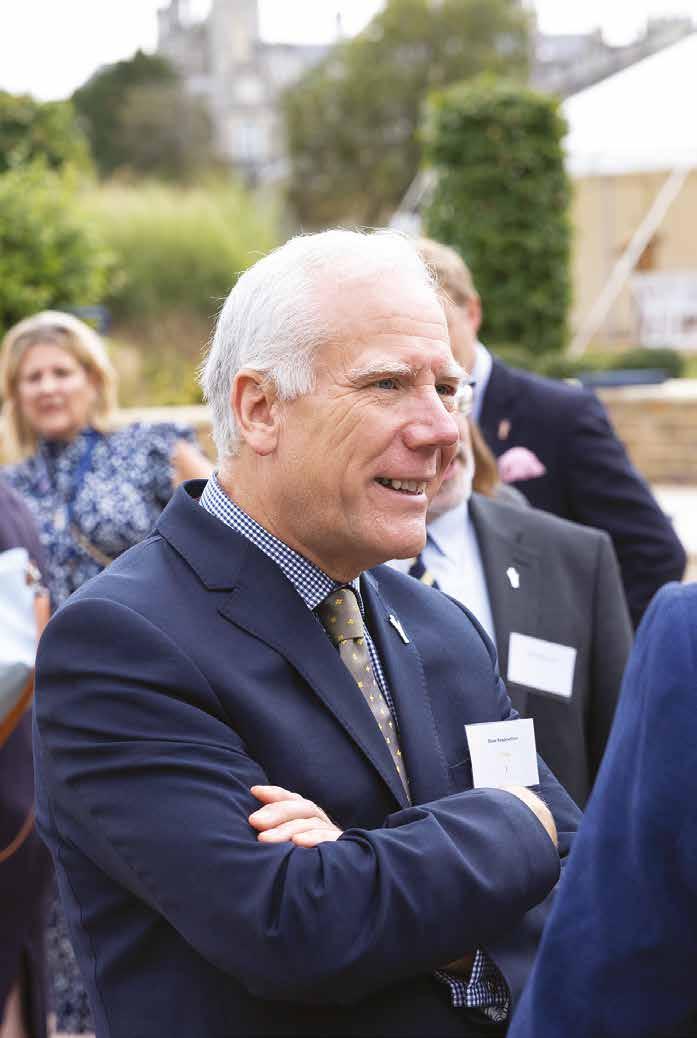
This exceptional charity has a very bright future


TRUSTEES’ REPORT AND FINANCIAL STATEMENTS FOR THE YEAR ENDED 31 MARCH 2025


This exceptional charity has a very bright future
Royal British Legion Industries (RBLI) is now three years into its new strategy, and I am delighted to say that progress is being made on all fronts.
Our strategy has delivered renewed focus on our beneficiaries, maximising our expertise in day-today care, welfare, and outstanding employability coaching. We were also guided by the need to ensure every part of our varied operations is financially sustainable. As a result, some difficult decisions had to be made.
Under the leadership of Lisa Farmer, who was recognised by His Majesty with an OBE this New Year, the charity has turned a corner. Across leaner, more focused divisions, we are working to maximise opportunities, and the impact we’re making is a testament to the work ethic demonstrated at every level of the organisation.
This year, we celebrated the completion of the Army Benevolent Fund Community Centre, a fantastic new space featuring a welcoming café, the Sir Donald Gosling IT Training Centre, and a fully accessible gym. We are also celebrating the completion of the fundraising for the final phase of our Centenary Village. Already, the new Community Centre is a thriving focal point for people of all ages working to recover from ill health, trauma, and homelessness. At the heart of our forward-focused community is personal development, woven into the design of our homes and facilities. Together with supported care, mobility assistance, and the development of independent living skills, we create communities where individuals can rebuild
confidence, reclaim independence, and transform their lives. The Centenary Village is already fulfilling our mission to empower veterans as they build a second life after service, and we look forward to welcoming even more residents when additional homes are completed in 2027.
On a personal note, I must thank Barratt Redrow, BAE Systems, and the incredible companies and individuals who throw themselves into The Great Tommy Sleepout with such passion. Communities across the country came together to raise awareness of veteran homelessness, helping us offer direct support to those across the UK who have been out in the cold. Once again, this event exceeded all expectations. The growth we have seen is not only encouraging; it is game-changing in terms of the homes and welfare we can now deliver.
Finally, I want to express my deepest gratitude to all RBLI staff and supporters who pulled together to turn the ship around. This exceptional charity has a bright future.
My sincere thanks.

STEVEN ROWBOTHAM Chairman August 2025
As our Chairman said, this year has been a turning point. We have reviewed all our activity and sharpened our focus, making purposeful decisions to identify where our strengths lie and invest where our impact is strongest, and we now stand in a strong place, with clarity and alignment between mission and strategy.
Significant progress has been made on our major projects; both the expansion of the Centenary Village and the ambitious plans for a new state-of-theart social enterprise and learning academy. These milestones reflect our mission to deliver thriving communities and tackle veteran homelessness with dignity and purpose. We have evidenced that 72% of the veterans who successfully transition to independent living also move into paid work. Once again, we are demonstrating why employability support must remain front and centre. Work provides dignity, independence, optimism, and greater flexibility in securing a permanent home. When navigating physical or mental health challenges, we know that simply spending time within the same four walls is not the answer. The right work opens the door to a new future.
At the same time, our social enterprise campaign continues to unlock opportunities for people overcoming physical and mental health conditions to build skills, gain transferable experience and access paid employment. People with disabilities do not want charity— they want opportunity, and that is what we are delivering. Our model is giving people life-changing chances and pushing expectations higher across the UK for veteran care and disability employment.
As part of this evolution, we made the decision to close our palettes division. While it had contributed to our journey, it was no longer aligned with our mission. Unlike our other thriving divisions, such as signage, the palettes operations presented increasing challenges. As we support more veterans with mental health conditions, we recognised that certain environments and roles must be adapted to better suit individual needs. This progress has informed the plans for our new £12.5 million social enterprise, designed to offer inclusive, flexible
workspaces for more veterans, that reflect the future of social enterprise at RBLI.
We’re proud to empower our bravest to fully transform their lives. RBLI’s social enterprise campaign has sparked national interest in social value procurement and aligns directly with the Government’s vision, expressed in the Social Procurement Act of February 2025. Across public sector projects nationwide, commissioners now expect meaningful social impact through the supply chain, and the timing of our campaign couldn’t be better.
We are also setting the pace for female Forces veterans by actively responding to their unique experiences and needs with the first multioccupancy home of its kind in the UK. Located at the Centenary Village, it offers wraparound support, skills development, coaching and paid employment opportunities, all within walking distance. As we continue to evolve to meet changing needs, we made the difficult decision to transfer our highdependency care services to a specialist provider, ensuring continuity of care on-site while allowing us to focus on our core mission.
To our extraordinary supporters: you’ve demonstrated time and time again that people do care about what happens to our Forces after service and do believe in disability employment.
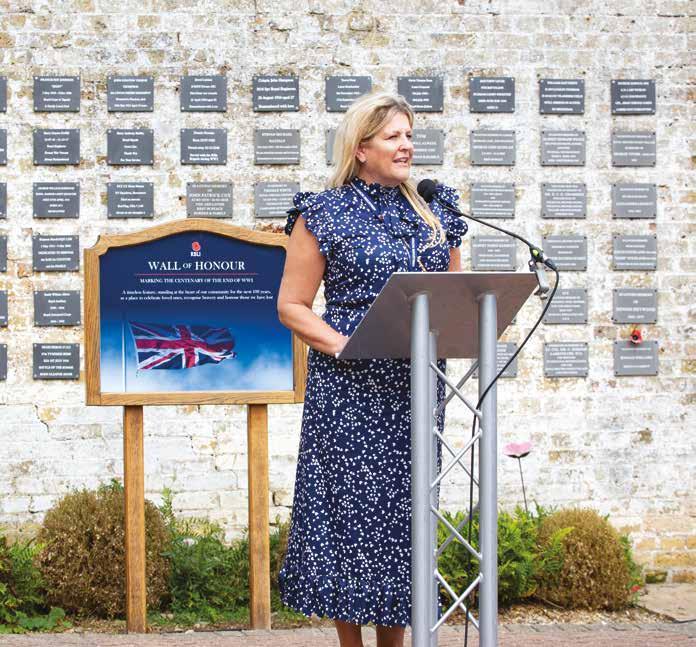
During his visit, the Minister for Veterans Al Carns praised the scale and impact of our operations, which continue to unite government, business, and philanthropy behind the most progressive and effective programmes for unemployed and marginalised people.
Across the country, we’re delivering vital employment coaching in disadvantaged areas — the kind of training that opens realistic opportunities and leads to lasting change. Our model is giving people a fresh start and pushing expectations higher for veteran care and disability inclusion.
We have taken huge strides forward, but this year hasn’t been easy. I want to thank RBLI’s incredible workforce, who have embraced our new strategy and values with a focus on our beneficiaries at every stage. And to our extraordinary supporters, you have shown time and again that that people
do care what happens to our Forces when they leave service, and people do believe in disability employment. We could not do anything at all without you.

LISA FARMER OBE Chief Executive August 2025
Royal British Legion Industries (RBLI) began in 1919 with a clear vision: that ex-servicemen overcoming tuberculosis, life-changing injuries, and shellshock could not only become well enough to live independently again but could also return to work and support their families. Our founders were ahead of their time in championing a social rather than purely medical understanding of disability and establishing a factory by 1921. From the beginning, they combined nursing care, shelter, and dignified paid employment to empower veterans to build a second life after service.
Today, our vision and mission remain unchanged. At our headquarters, we are successfully delivering integrated care, varied housing, employment coaching, paid work opportunities and mental health support—truly holistic services that are leading the way. Through our award-winning national programme, Lifeworks, we are reaching unemployed veterans across the UK. In partnership with the Ministry of Defence, we are delivering expert coaching to men and women being medically discharged from military service. We are empowering Britain’s Bravest to start a new life.
But our mission is now even more ambitious. We recognise that our success holds answers to some of the most pressing social challenges of our time:
• How to create meaningful employment opportunities for veterans with cognitive disabilities and adults with learning difficulties in an increasingly digital labour market
• How to help people return to work after a health or mental health crisis
• How to eradicate veteran homelessness
• How to live actively, and contribute meaningfully to society, well into our 80s and 90s
RBLI’s integrated homes, services, and expert return-to-work coaching are not only proving that people with long-term health conditions can work— and want to work—they are demonstrating how to empower individuals to completely transform their lives.
Our values sit at the heart of everything we do, shaping how we interact with one another, our customers and supporters, and crucially, with those who need our support.
Making an IMPACT is central to our mission. Embedding this within our values is important, reflecting our aim to maximise the positive difference we make in every action we take.
APMINTEGRITY
OTIVATED
EOPLE FIRST
We are proud of the how; committed to doing what’s best while maintaining transparency and respect at all times
We are motivated to maximise value through challenging ideas, innovation and embracing change
People are at the centre of everything we do; we care about those we support, our colleagues, our customers and our stake-holders
CCOUNTABLE
C OMMUNITY
TEAMWORK
We are all responsible for our actions and we inspire each other to make decisions and take ownership
We take pride in our inclusive and thriving community with its unique network of support
We achieve our goals together through the strength of our col-laboration and communication
To further embed our values, they each have an associated model of behaviour, helping staff to not only understand the importance and meaning of each value, but also how it looks in action.
They have also been incorporated into our core HR processes, from our reward and recognition schemes to our personal development and recruitment practices.
RBLI has earned recognition for its commitment to creating meaningful employment for veterans and people with disabilities, with a bold, inclusive model that puts them at the heart of operations. Through thriving social enterprises, award-winning programmes, and strategic partnerships, we are reshaping perceptions and proving that military experience and disability are assets, not barriers.
At the core of RBLI’s employment offer is sectorleading social enterprises, Britain’s Bravest Manufacturing Company (BBMC) and Scotland’s Bravest Manufacturing Company (SBMC). These commercial factories, based in Kent, Surrey, and Renfrewshire, employed over 100 people, 72% of whom were veterans, had a disability, or both.
These enterprises provide structured, stable employment and training opportunities for individuals who may otherwise be excluded from the workforce. Through commercial partnerships with organisations such as National Highways and Network Rail, BBMC and SBMC deliver premium services and products that demonstrate the viability and impact of inclusive employment at scale. Long before legislation demanded, RBLI embedded social value into every aspect of its commercial delivery. With the introduction of the Social Procurement Act (2025), BBMC and SBMC offer solutions for organisations seeking to meet new

requirements around social value in supply chains. By partnering with RBLI’s social enterprises, clients can achieve measurable impact in supporting veterans and people with disabilities, while fulfilling their procurement obligations with confidence and integrity.
RBLI’s Lifeworks programme is a structured pathway into employment, designed and delivered by veteran for veterans. The programme combines coaching, confidence-building, and tailored development. Within 12 months, 80% of participants secure paid work or volunteering, making Lifeworks one of the most effective employability interventions in the UK.
RBLI maintains formal collaboration with the Ministry of Defence and works alongside major UK employers to expand employment opportunities. These strategic partnerships reinforce RBLI’s commitment to inclusive hiring and ensure that veterans and disabled individuals are represented across sectors.
RBLI’s Village in Kent is unlike anywhere else in the UK. It’s a place for veterans of all ages to live, recover, and reconnect in a community built for dignity, independence, and care. With more than 300 homes, residents have access to an integrated care environment where they can progress as their needs change.
Our homes span long-term supported living at Queen Elizabeth Court and Greenwich House, transitional accommodation at the Centenary Village, and emergency provision at Mountbatten Pavilion. All homes prioritise independence, with onsite care, communal amenities, and structured welfare planning.
RBLI’s £28 million capital project, the Centenary Village, is a bold initiative to build 100 homes for 100 veterans and their families within a purpose-built, inclusive community. The development remains on track, with phase three of our Centenary Village
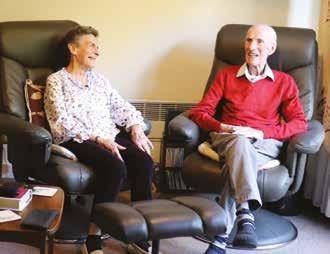
underway. National recognition has been secured through a £1 million pledge from the Office for Veterans’ Affairs.
Recent milestones include new female veteran housing, the first of its kind in the UK, additional apartments, and the completion of key facilities: an accessible gym, café, and digital learning centre, all designed to foster wellbeing and connection.
RBLI builds communities where veterans can recover, reconnect, and thrive, within our Kent Village and beyond. Our approach is shaped by lived experience and delivered through care, collaboration, and practical support. It’s not just about where people live, but how they live—and who stands alongside them.
Care is embedded in everyday life, not confined to clinical settings. Residents benefit from onsite support, communal amenities, and structured welfare planning that evolves with their needs. Facilities such as an accessible gym, ABF Community Centre, and digital learning hub foster wellbeing and independence, while promoting a sense of belonging and purpose.
RBLI works in partnership with specialist organisations to deliver services shaped by veterans’ individual goals. These include fitness and mobility training, digital inclusion, mental health and financial advice drop-ins, and skill-building sessions such as nutrition and cooking. Together, these
services create a responsive, wraparound support network that strengthens the community and ensures no one is left behind.
RBLI delivers person-centred welfare for veterans facing complex challenges, from financial hardship and health conditions to social isolation and substance abuse. Welfare services are proactive and practical. Residents engage in job clubs, wellbeing sessions, fitness, and peer-led activities. The ABF Community Centre, accessible gym, and welfare drop-ins make support accessible and responsive to need.
Support is structured through STEP-IN: a tailored framework that helps individuals stabilise and move forward. Through the work we do, we know what veterans need and this insight has driven our passion to push the work even further.
RBLI’s community model continues to evolve through collaboration, insight, and impact. It offers a blueprint for veteran support that reaches far beyond the Village, proving that while homes can be built anywhere, true community is cultivated.

RBLI’s social enterprises continue to deliver strong commercial performance while achieving measurable social impact. Britain’s Bravest and Scotland’s Bravest Manufacturing Companies’ commercial factories generate millions in revenue through national customers, including Network Rail, National Highways, Sizewell C, Barratt Redrow, and Reds10.
According to Social Enterprise UK, every £1 spent with a social enterprise contributes £3 to the UK economy through direct impact, job creation, and reinvestment. By choosing RBLI, organisations not only meet procurement obligations under frameworks such as the Social Value Act, but also actively contribute to a more inclusive economy. Our social enterprises offer a proven route to drive positive change at scale, while maintaining the quality, reliability, and professionalism expected of any national supplier.
Partnerships with philanthropists and corporate sponsors deliver the most exciting and progressive projects in disability employment and veteran care in the UK. Fundraising remains a vital revenue stream for RBLI, spanning individual giving, community events, and major donations. This year’s campaigns demonstrated strong public engagement and donor commitment, sustaining services that directly support veterans and people with disabilities. Partnerships with corporate sponsors and national philanthropic initiatives continue to build RBLI’s profile and long-term resilience.

RBLI’s commitment to its workforce underpins every strategic goal. Ongoing investment in staff training, wellbeing, and internal communication ensures employees are equipped, engaged, and aligned with our values. A team-focused culture, supported by safeguarding and inclusion initiatives, remains central to RBLI’s delivery model and longterm success.
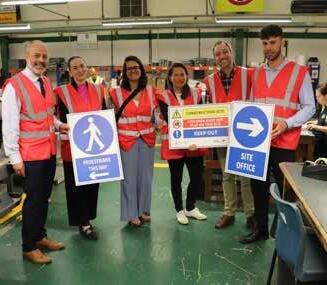
Retail continues to contribute significantly to RBLI’s income while driving national awareness of our mission and brand. Our iconic Tommy range, from commemorative military figures to embroidered clothing, plays a central role in this visibility. The Tommy figure has become a national symbol of remembrance and veteran support, representing sacrifice, service, and solidarity with the Armed Forces community. It was originally designed to bring the memory of fallen soldiers into public spaces and has since evolved into a powerful emblem of RBLI’s mission.
Tens of thousands of Tommy figures have been sold across the UK, raising funds to support veterans through employment, housing, and welfare services. Each product, from a commemorative pin to embroidered clothing, is made or fulfilled by veterans and individuals with disabilities at Britain’s Bravest Manufacturing Company.
Many of RBLI’s corporate partners support its work across every strand of delivery, from being clients of our social enterprises and championing disability employment within their own organisations, to collaborating with the Lifeworks programme and fundraising. Together, these partnerships help us extend our impact, shape public understanding, and promote inclusive opportunity across the UK.
Our flagship national partnership with Reed in Partnership enables us to deliver for the Ministry of Defence, providing integrated support to veterans through our Village headquarters and beyond. Venue partners across the UK make our award-winning Lifeworks programme possible in new locations, while referral partners, particularly those in the Op Fortitude network, play a vital role in welfare support, including emergency accommodation for veterans in crisis.
RBLI depends on trusted partners to deliver truly holistic, joined-up support. Every partnership helps us build a more inclusive society, where veterans and people with disabilities are recognised not just for their needs, but for their potential.
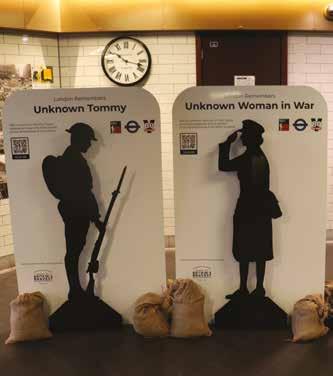
RBLI’s ethos places employability at the heart of everything we do, and at the core of our forward-focused community. We are ambitious in our belief that people overcoming life-changing injuries, longterm health conditions, and learning difficulties can live independently and thrive in meaningful employment.
We have proven that work is the key to tackling homelessness, offering people genuine options and delivering outcomes that are positive, practical, and truly sustainable. People with disabilities aren’t asking for charity but opportunity. There is no other charity investing as deeply in employment pathways for disabled people as RBLI.
RBLI will have a thriving village community and facilities in Kent that maintain our heritage and that are a national example of excellence in integrated care and welfare services.
RBLI will be regarded as experts in supporting veterans and people with disabilities into employment, through our award-winning employment programmes and through our social enterprise across the UK.
RBLI will establish our national presence through partnerships and fundraising. RBLI will be known as a national charity with a headquarters in Kent.
RBLI will be an employer of choice with a fully comprehensive diversity and equitable culture embedded by a strong set of values.
RBLI will build income streams that protect our services, fund capital developments, and expand our national impact through a combination of philanthropy, social enterprise, and procurement partnerships. Our approach will be proactive, transparent, and focused on creating tangible social value.
RBLI’s Village in Kent is unlike anywhere else in the UK. It’s an intended community for veterans of all ages to live, recover, and reconnect in a community built for dignity, independence, and care. With more than 340 purpose-built homes already delivered, the Village blends RBLI’s heritage with a modern model of support that’s designed to grow with veterans as they transition through different stages
RBLI has given me the chance to move forward.


• The Centenary Village development has secured major pledges to complete the final phase in full, including the flagship apartments that form the Village’s entrance.
• Delivery of dedicated housing for female veterans – the first of its kind in the UK. All new homes are fully occupied. Currently, 27% of Village residents are female.
• Completion of outstanding new facilities: The Army Benevolent Fund Community Centre, the Sir Donald Gosling IT Learning Centre, café, and fully accessible gym.
• In Autumn 2024, Veterans’ Minister Al Carns visited the Centenary Village and pledged £1 million in support from the Office for Veterans’ Affairs. This was a powerful endorsement of RBLI’s integrated model at a national level.
• The sale of RBLI’s high-dependency care provision has been completed, ensuring continuation of vital services and coordinated referrals throughout the wider Village infrastructure.
• Support from The Armed Forces Covenant Fund and The Army Benevolent Fund enhanced energy efficiency and affordability for veterans.
• Fair Oak Crescent, named in honour of the Oak Foundation, reflects our successful blend of adapted and Move On apartments, family homes, and Assisted Living units to create a diverse and thriving community.
• Complete the £28 million Centenary Village housing development to deliver 100 homes to 100 veterans and their families.
• Continue to provide a holistic model of support, with employability at its heart, to help end veteran homelessness in the UK.
• Promote RBLI’s village model as a leading national example of veteran housing and integrated care, building on its proven success in supporting veterans into paid employment, while fostering sustainable communities that combine employment, support, and independent living.
• Continue to develop tailored support pathways for specific groups, including female veterans.
• Expand the Community Centre’s offerings, including fitness and motivational sessions, digital inclusion, vocational coaching, and independent living support.
• 72% of successful Move On outcomes were achieved by veterans who secured paid work, so continued focus will be placed on helping veterans and people with disabilities access job opportunities.
• Continued investment in vocational training, volunteering, and opportunities to explore hobbies and personal interests.
• At the centre of RBLI’s Centenary Village, a new central green, forming what will be known as The Crescent, is set to become a key community landmark. It was here that Her Late Majesty Queen Elizabeth II buried a time capsule in 2019, marking the space with lasting significance.
RBLI’s employment ecosystem combines inclusive commercial operations and targeted employability programmes. This dual pathway connects individuals to stable work, skills development, and long-term independence.


• 105 veterans and people with disabilities were employed at our social enterprises, many of whom would not have been able to work elsewhere.
• Launching capital campaign and preparations for construction of a new state-of-the-art manufacturing enterprise. This major development includes a learning academy, hundreds of skill placements, expanded digital opportunities, and more than 40 full-time roles in sign making.
• RBLI is contributing to evaluation work exploring the impact of the 4th industrial revolution, including AI, on disability employment, helping shape future strategy and inclusive workforce planning.
• BBMC and SBMC grew commercial output nationally: signage sales increased to £4.7 million. A rise in vinyl conversion to 47,000m² contributed to the manufacture of more than 160,000 signs.
• Significant new contracts were secured: Barratt Redrow, HW Martin, Hochtief, ScotRail, Mar Hall Hotel, Trust Housing, Morgan Sindall, and Altrad.
• Investment in BBMC Aylesford expanded both capability and capacity, including the addition of high-speed digital printing equipment, new CNC routing machinery, and a second production cell.
• SBMC Renfrewshire improved efficiency and working conditions via capital upgrades.
• BBMC Leatherhead installed a perfect bind machine, enabling book-binding work to be brought in-house, unlocking new revenue and reducing subcontracting.
• RBLI restructured its business activities and made the strategic decision to divest its pallets division. This move ensured continued alignment with RBLI’s financial and employment goals, while beneficiaries previously employed in this area were successfully redeployed within RBLI’s value chain, maintaining continuity of support and inclusion.
• Deliver partnership with the MOD and Reed in Partnership to support veterans who are injured or sick in creating a new life after service. Despite a change in provider, RBLI’s unique expertise was retained.
• Lifeworks launched nationally, including the first course to be delivered in Northern Ireland.
• Lifeworks families was introduced, expanding support to spouses and partners of service personnel, and veteran families.
• Courses tailored for Royal Navy and Royal Marine veterans were delivered in Liverpool and Gateshead.
• Lifeworks was publicly recognised by HRH King Charles III for its role in veteran transition.
• Secure full funding for an ambitious state-of-theart social enterprise development. The new social enterprise will include impactful environmental factors and a learning academy. This project will create hundreds of jobs and skills placements for disadvantaged veterans.
• Continue scaling factory employment for veterans and disabled individuals as part of a proven social enterprise model.
• Launch e-commerce platforms for B2B and directto-consumer retail.
• Enter the vehicle signage market; revenue targets across sites set at £6.5 million.
• Roll out the “One Social Enterprise” approach, streamlining national capacity and improving ERP infrastructure for operational efficiency.
• Establish regional Lifeworks hubs in high-need areas.
• Align delivery with the government’s VALOUR initiative to embed services within national veteran support frameworks.
• Expand referral partnerships, including new collaboration with Walking With The Wounded.
I went from feeling 40% like myself to closer to 70%. Lifeworks had a lot to do with that. It didn’t just end when the course finished – it's been working on me ever since.
RBLI continues to build visibility and influence across the UK through strategic partnerships, national campaigns, and collaborative service delivery. By championing social value through inclusive employment and enterprise-led impact, RBLI has strengthened its profile in key regions, deepened engagement with government and corporate partners, and embedded its services into national policy conversations.
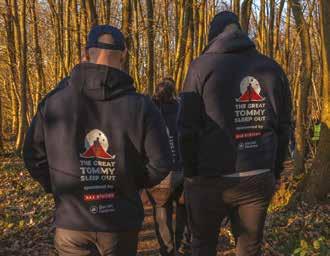

• Sustained commercial growth at RBLI’s social enterprises, BBMC and SBMC, securing new contracts to expand operations while delivering measurable more social value through the creation of meaningful jobs for those facing barriers to work.
• Secured significant pledges to make the completion of the Centenary Village a reality, bringing RBLI’s long-term vision for holistic veteran support closer to full delivery.
• Veterans’ Minister visited RBLI’s new facilities and services and praised the scale and ambition of the Centenary Village, recognising the national importance of the holistic support model.
• RBLI joined the Op FORTITUDE network of emergency beds, linking up with homeless charities UK-wide to help disadvantaged veterans access safe accommodation and support more quickly.
• Enhanced service expansion through restricted donations, including delivery of a pilot project with Armed Forces Covenant Fund Trust (AFCFT) to support homeless veterans through emergency housing and employability interventions.
• Initiated a new collaboration with Reed in Partnership in October 2024, following successful delivery of vocational assessments for the Ministry of Defence. Between October and March, 142 veterans were supported through the programme.
• Delivered high-profile national fundraising campaigns, including The Great Tommy Sleep Out, which won Charity Campaign of the Year at the Third Sector Awards. The campaign secured support from Barratt Redrow and BAE Systems, and featured a creative advert from veteran adventurer Levison Wood.
• Participated in the Lord Mayor’s Big Curry Lunch, where RBLI was publicly recognised by HRH King Charles III for its contribution to veteran transition support.
• Involved beneficiaries and ambassadors in highprofile events—figures such as Hari Budha Magar, Steve Hammond and Ash Alexander Cooper helped inspire others to aim high following injury, disability or trauma.
• Delivered a multi-platform commemorative campaign for D-Day, featuring limited-edition Tommy products, a new regular giving drive, and fulfilment powered by RBLI’s social enterprise.
• Built strong corporate and delivery relationships with First Port, Babcock International, Seat Unique, Annington, Leonardo, and Reds 10.
• Received high-value gifts in kind from Next PLC, B&Q, and Define Fit Out, enabling site upgrades and Village development without additional capital expenditure.
• Advance development of RBLI’s new social enterprise facility in Aylesford to increase operational capacity and create more jobs for veterans and people with disabilities.
• Continue to expand RBLI’s social enterprise customer base, entering new markets and building strategic partnerships to deliver greater social value; creating more jobs, driving inclusive growth, and positioning RBLI as a supplier of choice for ethical, impact-led procurement.
• Leverage the capital campaign for RBLI’s new manufacturing enterprise as a catalyst to spark national conversation, shaping debates on disability employment, social procurement, and the future of British manufacturing.
• Increase procurement engagement with defence and national infrastructure firms, embedding RBLI’s social value model into major project frameworks and CSR delivery.
• Grow high-value donor relationships and RBLI’s legacy giving campaigns to support long-term sustainability.
• Lead national commemorative campaigns around the 80th anniversaries of VE and VJ Day, using RBLI’s heritage and veteran voices to garner public and stakeholder support.
A friend, and fellow veteran, introduced me to RBLI - and that was the turning point
• Ensure Lifeworks outcomes and progression pathways continue contributing to national conversations on veteran care and employment policy.
• Continue fundraising to expand Lifeworks nationally.
As a people-first organisation, we recognise that investing in our staff is essential to achieving our strategic objectives and establishing ourselves as an employer of choice. We believe that a motivated and team-oriented workforce is the key to RBLI’s future success.
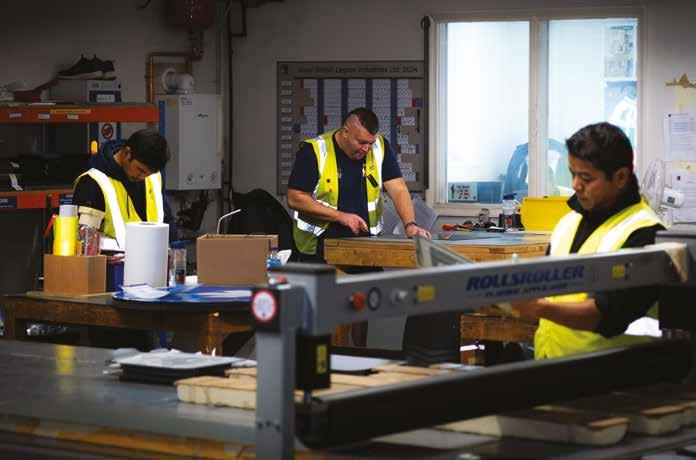

Two and a half years ago, I was close to giving up. Now I’m working towards a degree. I wouldn’t be here without RBLI.
• Embedded IMPACT values across the organisation, including within the Performance Development Review (PDR) process, job descriptions, and employee recognition scheme.
• A collaborative report by Scotland’s Bravest Manufacturing Company, Glasgow Caledonian University, and Forces in Mind Trust highlights the transformative impact of accredited workplace training and formal qualifications in empowering veterans to build successful civilian careers.
• Maintained the Real Living Wage across all departments, supporting financial security and equity for our workforce.
• Staff mental wellbeing remained a priority, supported by a dedicated network of mental health first aiders, who provide guidance and assistance as needed.
• Continued to champion a Disability Confident approach — actively recruiting, supporting, and retaining individuals with disabilities, while fostering an inclusive workplace that removes barriers and promotes equitable opportunity.
• Strengthened the management development programme, to include finance, governance, people management, and data literacy.
• Grew the volunteering programme to include 215 individuals, giving more than 5,000 hours of support, including roles within Social Enterprises and fundraising campaigns.
• Offered a formal Volunteering Day for every member of staff, supporting connection with wider causes.
• We revised the structure of the staff forum to enhance its effectiveness and improve staff engagement.
• Introduced mandatory training on bullying, harassment, and sexual harassment in response to updated legislation.
• Responded to the staff survey by focusing on improving internal communication.
• Preparation is underway for the launch of the new learning academy at Britain’s Bravest Manufacturing Company, which will provide over 100 structured learning placements each year.
• Repeat the employee engagement survey to evaluate the success of initiatives and shape future culture and leadership initiatives.
• Continue enhancing communication pathways for staff.
• Reaffirm RBLI’s Real Living Wage commitment and explore additional pathways for fair progression across roles.
• Expand the volunteering programme with structured opportunities that support both staff development and direct service impact.
• Scale learning and development offers across departments, ensuring staff are equipped for current roles and future career growth.

RBLI’s financial sustainability is grounded in proactive strategy, diversified income, and commercial innovation. By balancing philanthropy with enterprise, RBLI funds core services while building the capacity for long-term growth.

RBLI saved my life and gave me a new future.
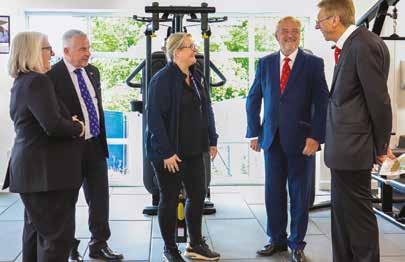
• Developed a five-year growth plan for RBLI’s social enterprise in collaboration with Rothschild & Co.
• Secured £7.5 million from donors and significant pledges to directly improve the lives of people with disabilities and veterans of all ages across the UK.
• The Great Tommy Sleep Out campaign was awarded Charity Campaign of the Year at the 2024 Third Sector Awards, and significantly broadened RBLI’s donor base and national profile.
• Secured restricted donations to support service expansion, including Lifeworks delivery in Gateshead and Arundel, and the Armed Forces Covenant Fund Trust (AFCFT) supporting homeless veterans.
• Advanced income generation from commercial contracts, with Social Enterprises delivering over £4.7 million in signage sales and adding new clients across road, rail, and hospitality sectors.
• Strategically managed land assets to begin rebuilding unrestricted reserves.
• Received generous gifts in kind from corporate partners to support housing infrastructure, including the Centenary Village and site-wide upgrades.
• Coordinated D-Day fundraising and retail activity, integrating commemorative products with a successful regular giving campaign and expanded donor engagement.
• Successfully divested the charity of activities that were no longer financially sustainable.
• Optimised operational costs at BBMC Leatherhead through strategic equipment upgrades, including the addition of an in-house book-binding capability.
• Laid groundwork for new fundraising channels, including legacy giving and e-commerce expansion.
• Deliver a growth plan through capital developments, including a new social enterprise facility, where job creation for veterans and people with disabilities generates revenue that’s consistently reinvested into further employment, community support, and enterprise growth.
• Achieve £9 million in combined manufacturing income across all enterprise sites by 2028, driven by a growing and diversified customer base. This will be underpinned by expanded product portfolios, stock-led fulfilment, and more professionalised procurement strategies that deliver greater value, improved cost-efficiency, and enhanced responsiveness to market demand.
• Strengthen procurement engagement with defence and infrastructure sectors to unlock social value income and establish RBLI as a preferred supplier.
• Deliver a full upgrade of RBLI’s veteran housing by 2030, ensuring all accommodation continues to meet, and where possible exceed, the Decent Homes Standard.
• Build on the proven success of RBLI’s fundraising campaigns, such as The Great Tommy Sleep Out, which has galvanised thousands of supporters and raised significant income to support veterans nationwide.
• Grow RBLI’s legacy giving campaign to build longterm philanthropic support and strengthen future funding security.
• Introduce e-commerce functionality across retail channels to engage direct consumers and streamline product fulfilment.
Royal British Legion Industries Ltd. (RBLI) is a charitable company limited by guarantee. It was first set up on 3 September 1919, under the name Industrial Settlements (Incorporated) Limited. It is governed by Articles of Association, which were last amended in March 2025. The Articles set out its charitable objects, which are:
■ The relief of those in need by reason of age, ill health, disability, or incapacity.
■ The relief of the charitable needs of members and former members of HM Forces, their relatives, and dependents.
■ The advancement of education and training.
■ The relief of unemployment for the benefit of the public in such ways as may be deemed appropriate, including the provision of assistance in finding employment.
■ To promote equality of opportunities for people with disabilities in relation to access to employment.
As both a charity (registered charity numbers for England & Wales 210063 and Scotland SC048795) and a company (registered company number 00158479), RBLI is subject to both charity and company law. It is further subject to all relevant legislation within its geographical areas of operation, those being England and Scotland. The registered office of the charity is situated in England.
The Trustees in office during the year and at the date of this report, the Senior Leadership Team of the charity, its principal places of business, and its professional advisers are set out on pages 59 and 60 of this report.
The Board provides overall policy direction while the management of the charity is delegated to the Chief Executive and the Senior Leadership Team. The Board meets quarterly, and papers, including business plans and budgets, are made available prior to Board Meetings.
The Articles of Association require that the Board of
Directors (Trustees) consists of a minimum of two but no more than fifteen members of the charity, excluding any ex officio members of the Board. Trustees are formally appointed by resolution of the Board at any Board meeting. Alternatively, Trustees can be proposed at a General Meeting by the members of the charity.
Trustees are recruited based on the skills required for the Board. To support this, a gap analysis is undertaken against the agreed skills and experience. The recruitment process, which is based on the Trustee Recruitment Policy, ensures that there is a diversity of interests and experience brought to the Board. During the year, ten new trustees were recruited, and four have resigned.
Newly appointed/elected trustees are given induction training on their duties and responsibilities. This includes, although is not limited to, provision of key documentation such as Articles of Association, reports and financial statements and details of divisional work streams. In addition, visits to the various Royal British Legion Industries sites are undertaken as part of the onboarding process, at which introduction meetings are held with key staff members. There are several key policies in place for trustees, including the Code of Conduct and Conflicts of Interest Policy, which are provided during this period.
The Board of Trustees holds strategy days with the Senior Leadership Team at least once a year. The Board reviews existing operations of the charity and considers strategic options for the future. During the year, trustees attended a number of events both on and off-site, including the Staff Awards.
The Board has five formal sub-committees, all of which have approved terms of reference, are chaired by a trustee with relevant experience, and have a membership of trustees, with the Chief Executive and other Senior Leadership Team members in attendance. One of these, the Audit and Risk Committee, was constituted during the year, with the first meeting being held in November 2024.
During the year, the following committees were in place and held meetings at least quarterly in line with the Board timetable.
Village (formerly Care & Welfare Committee)
The Village Committee considers all care and welfare matters across the Village, reviewing:
■ standards of care within the care and welfare setting
■ relevant risk registers
■ significant incidents
■ audit and inspection results
The committee is also responsible for providing updates in relation to any developments within the sector both locally and nationally.
The Estates Development Committee is responsible for overseeing the Strategic Property Plan, which provides the vision for estates development across RBLI, and overseeing any major property projects as well as the ongoing maintenance and development of the Centenary Village. It also reviews the Property Asset Management Plan, which details the maintenance requirements of the properties.
The Finance, Performance and Remuneration Committee is responsible for reviewing the operational and financial performance of RBLI, considering strategic and corporate risks, and evaluating the effectiveness of the risk management approach. It oversaw the annual audit process.
The Social Enterprise Committee is responsible for overseeing the strategy and operations for the Social Enterprise, which itself operates over three sites, including one in Scotland, and overseeing the operational and financial performance.
During 2024, the Board undertook a review of the governance structure in place. As a result, the committee structure was subject to change in late 2024, with the addition of an Audit & Risk Committee and a reallocation of some areas of responsibility. The Audit & Risk Committee responsibilities will include:
■ providing oversight in all aspects of financial reporting, compliance, internal control, and risk
■ evaluating and approving key policies for areas such as accounting and finance
■ appointing and engaging with external and internal auditors, as well as overseeing the annual audit process.
The Senior Leadership Team (SLT), which comprises the Chief Executive and the divisional directors, is the Principal Management Committee for RBLI and is given delegated authority for day-to-day matters through the formal Scheme of Delegation. All members are accountable to the Chief Executive and through this support, for the delivery of the short to medium-term strategic decisions for the organisation. There are SLT meetings held fortnightly, covering both performance and strategy. Members of the SLT attend Board and Sub-Committee meetings when required, to present papers for their area of responsibility. The Chief Executive, Director of Finance and Performance, and the Company Secretary attend all Trustee Board meetings.
A director with extensive experience in governance, risk management, and assurance oversees this function. This role also acts as the Data Protection Officer, Company Secretary, and the Freedom to Speak Up Lead, the latter being a role introduced in March 2024 as part of the regular review of the Whistleblowing Policy.
The Governance team leads on risk, data protection, and legal and regulatory compliance. They also handle policies, procedures, and all company secretariat matters. The governance training programme previously developed continues to be rolled out over the year.
The assurance framework developed in the previous financial year continues to be strengthened and now links with the review of the Articles of Association and Board Sub-Committees. The purpose of the assurance framework is to give sufficient, continuous, and reliable assurance to
Trustees on RBLI’s governance and management of the major risks, thereby helping to ensure effective and efficient working practices. As part of this programme, departmental heads provide an annual self-assessment against internal controls. These are summarised at a divisional level, approved by directors, and at a corporate level. The corporate level summary forms the basis of an annual Statement on Internal Control, which is signed by the Chief Executive and the Director of Governance, Compliance and Business Systems on behalf of the SLT. Action plans have been established for areas where further work is required.
In support of the assurance framework, a compliance programme is in place. This is risk-based and areas reviewed during the year and to date include the care and welfare settings and undertaking mock-CQC inspections, data systems within property services, and compliance with areas such as PCI DSS. Action plans are developed to address any weaknesses identified. All findings are reported to the relevant board sub-committees and the board in summary.
RBLI supports the principles of the Charity Governance Code, as shown by the board’s formal adoption of this code in September 2021. During the 2024/25 financial year, compliance with the Code was under constant review. An area identified in the previous year was the need to strengthen the approach to equality, diversity, and inclusion within the membership of the Board. This was significantly improved during the latest recruitment campaign, but will continue to be monitored going forward.
The charity sets the highest standards for our fundraising and complies with the relevant charity and data protection laws. Our aim is that supporters and volunteers are able to give to and fundraise for RBLI with confidence and trust that their hard work and generosity make a difference. RBLI is a member of the Fundraising Regulator and complies with the Fundraising Code of Practice, keeping records up to date with Fundraising Preference Service registrations.
The Supporter Promise describes how fundraising activity is approached, with details of how to contact RBLI if this falls short. The RBLI team is small and, in some cases, uses third-party agencies with specialist expertise to support its work. This is a more costeffective way of working than trying to do everything in-house. Each external supplier has been carefully selected, and there is a service level agreement in place that is monitored closely.
RBLI believes in being transparent, open, and honest in relation to our fundraising and in how veterans and everyone who benefits from RBLI services are represented. The charity is careful to engage them in the planning and ensure they have given permission before materials are made available to our supporters or the general public.
The Trustees confirm that reference has been made to the guidance contained in the Charity Commission’s guidance on public benefit of the Charities Act 2011. When reviewing the charity’s aims and objectives, and in planning future activities, the Senior Leadership Team is involved in strategic planning with the trustees, and their recommendations are then formally approved by the Board.
The Trustees are satisfied that the current and planned activities will continue to align and meet the public benefit requirement as outlined in the Charities Act 2011, namely through the promotion of community interests, and assisting veterans and disabled people
RBLI is committed to providing an excellent standard of service to all its beneficiaries, users, customers, and the organisations it supports across its diverse operations. Positive feedback is encouraged when this standard is met. Where the service falls short, concerns and complaints are taken seriously, with the aim of resolving issues as quickly as possible and driving improvement.
A formal complaints policy and procedure is in place, underpinned by local processes. The procedure outlines who is responsible for responding to and
investigating complaints, depending on their nature. It also sets out the three-stage complaints process, including how to progress to the next stage if a complainant remains dissatisfied.
Where possible, complaints are investigated at a local level with oversight from the relevant director, progressing through the stages as needed. The aim is to meet the response deadlines set out within the procedure. During the year, this standard was not always achieved, and steps are being taken to address performance in this area.
A Risk Management Strategy is in place that outlines the overarching risk framework, including how risks are addressed at operational, corporate, and strategic levels. RBLI promotes a risk-aware, rather than risk-averse, culture—recognising that taking opportunities, such as the development of the Centenary Village or the construction of new HQ facilities, inevitably involves a degree of risk. These risks must, however, be managed within a clearly defined and acceptable framework.
Risk registers are maintained at departmental, divisional, corporate, and strategic levels, with a formal mechanism for escalation. The Corporate Risk Register, derived from escalated divisional risks, is reviewed at Senior Leadership Team (SLT) meetings every four weeks. Divisional directors are responsible for ensuring that risks within their areas are managed in line with acceptable target risk levels.
The Strategic Risk Register, which includes risks identified by the Trustees and the SLT, is reviewed at every Board and SLT meeting. This register is also subject to detailed scrutiny by the Finance, Performance and Remuneration Committee. Responsibility for this oversight will transition to the newly formed Audit and Risk Committee.
As in the previous year, individual risk appetites have been reviewed to support RBLI’s overarching Risk Appetite Statement. The current statement, unchanged from the prior year, is set out below:
‘RBLI has no risk appetite for any health and safety or safeguarding risks that could result in injury or harm to staff, volunteers, residents, beneficiaries,
or any other relevant stakeholder. The safety and care of others is behind everything we do, and we will continue to ensure robust controls are in place to mitigate risks in these areas.
In addition, the tolerance levels set for the failure to comply with legislation and regulations or for financial loss is low and accordingly we continue to review the controls in place within these areas to ensure that there is no negative impact on the people we employee, care for and support.
As an organisation that is risk aware rather than risk averse, RBLI is willing to acknowledge and therefore accept that occasionally there may be risks arising in relation to areas such as the cultural change programme we are currently undertaking and the recruitment and retention of staff, which may materialise. As with all the risks we face these remain under review and work continues to reduce the likelihood and mitigate any potential impact.’
The table below outlines the principal strategic risks identified as having the greatest potential impact on the achievement of RBLI’s objectives. These risks are based on the Strategic Risk Register as at the year-end and have been updated to reflect any developments occurring since that date.
In a complex organisation such as RBLI there are potential health and safety risks to staff, in particular within our manufacturing businesses, if training and awareness is not maintained or we operate with an insufficient maintenance programme for machinery and building.
Reduction in reserves and cashflow because of lower occupancy rates in Living, lower sales in manufacturing, higher use of agency care staff or general cost increases that cannot be passed on to customers.
■ Good level of resources in place, including across the organisation
■ Risk assessment process
■ Equipment inspections
■ Programme of training, inspections, and audit in place
■ Developing health and safety support roles within each division
■ Strengthening governance through revision of the health and safety committee structure and providing IOSH training across the organisation
■ Strengthening reporting processes through introduction of specialist health and safety software
■ Revisiting building maintenance programme
■ Cost reduction programme
■ Annual budget setting process, which includes review and challenge from SLT and Trustees
■ Management of working capital, particularly stock and receivables
■ Monthly performance reviews led by Chief Executive and Director of Finance and Performance
■ Annual going concern exercise
■ Extensive use of KPIs and dashboards
■ Finance Committee and Audit & Risk Committee
Attracting and retaining staff
The current active employment market results in difficulty recruiting and/or retaining staff and higher costs through greater staff turnover.
■ Strong marketing campaigns for recruitment into the care settings
■ Initiatives to improve staff engagement such as the Chief Executive’s Roadshows and Tactical Teams
■ Staff Forum
■ Open-door sessions
■ Strong training programmes
■ Organisational values, which were developed through collaboration with staff
■ Training and development programmes
Legislation and regulations
Non-compliance with laws and regulations because of inadequate training could result in reputational damage, regulator intervention and fines and associated financial loss.
Cyber Security
Lack of continued training and investment in security could cause data breaches and the resulting reputational damage and fines.
■ Internal support provided by the Governance Team
■ Director of Governance, Compliance & Business Systems has oversight
■ Robust employment processes that ensure the employment of competent staff
■ Continual training in key areas such as GDPR
■ Formal review processes such as audits
■ Monitoring programmes
■ Regular testing, both internally and using external providers
■ Ongoing training
■ Policies and procedures
■ Automated controls
As permitted by the Articles of Association, the charity indemnifies the Directors/Trustees against any liability incurred in that capacity to the extent permitted by the Companies Act. There is an insurance policy in place for directors and officers, with the amount covered in the financial year being £2 million.
In so far as the Trustees are aware:
■ There is no relevant audit information of which the charity’s auditors are unaware.
■ The Trustees have taken all the steps that they ought to have taken as a Trustee to make themselves aware of any relevant audit information and to establish that the charity’s auditors are aware of that information.
Kreston Reeves were appointed by the Board as auditors of the charity for the 2024/25 financial year.
Trustees have a duty to promote the success of the charity under section 172(1) of the Companies Act 2006. As the trustees of RBLI, we always act in good faith and would promote the success of the charity for the benefit of its members as a whole and in doing so have regard, amongst other things, to:
■ The likely consequences of any decisions in the long term
■ The interests of employees
■ The need to foster the charity’s relationships with third-party stakeholders
■ The impact of the charity’s operations on the community and the environment
■ The desire for the charity to be best in class for providing support to beneficiaries
■ The need to act fairly and equally towards our members
The Trustees of RBLI consider, both individually and together, that they have acted in good faith to achieve the above. The Trustees delegate day-
to-day management and decision making of RBLI’s operations to its Chief Executive and Senior Leadership Team, and this plays a key part in ensuring the Trustees’ duty in this area is fulfilled. Trustees are members of various committees with senior staff in attendance, where regular operational updates are provided.
More strategic updates are provided at Board meetings to ensure the charity is on target to meet its strategic objectives for beneficiaries and the wider community.
As a respected charity with care for individuals at its core, RBLI recognises the importance of not only ensuring the wellbeing of its beneficiaries but also minimising its environmental impact. Reducing the organisation’s carbon footprint and waste and acting as a responsible steward of its natural resources, are widely accepted, and increasingly expected ways of delivering meaningful, sustainable impact.
The Environmental Management System continues to be accredited to ISO14001. It is integral to supporting the continuous reduction of RBLI’s environmental impact.
RBLI’s emissions reporting methodology aligns with the requirements of the UK Energy Savings Opportunity Scheme (ESOS). It encompasses energy consumption where RBLI receives direct billing from utility providers, including cases where utility costs are recharged to third parties. Where tenants are billed directly for their energy usage and RBLI does not exercise operational control, such consumption is excluded from the scope of reported emissions.
Emission calculations are based on utility billing data. Where billing records did not cover the full year, estimates have been included using historical consumption data.
RBLI has a published Carbon Reduction Plan and continues to make progress against its environmental objectives. During the reporting period, the organisation advanced to Phase 3 of the UK Energy Savings Opportunity Scheme (ESOS). This submission has informed the Environmental Management System and supports compliance with wider energy reporting requirements, providing confidence in the measures being taken to meet net-zero targets.
A range of improvement initiatives and projects are ongoing to reduce environmental impact. Planning for new buildings incorporates environmental considerations throughout both construction and operational phases.
RBLI’s Environmental Policy Statement is available on its website.
In 2024/25, RBLI’s total income slightly decreased to £24.4 million (2023/24: £26.7 million), and total expenditure also decreased to £22.8 million (2023/24: £24.3 million). Net income for the year, after interest and including gains and losses on the investment portfolio, was £1.63 million (2023/24: £2.41 million). The net increase in funds was £1.63 million (2023/24: £2.41 million).
Fundraising Income: £6.3 million (2023/24: £4.7 million)
With the Trustees’ grateful thanks to the generous philanthropists and strategic grant-makers, without whom, RBLI’s work could not happen:
Annington, The Armed Forces Covenant Fund Trust, The Army Benevolent Fund, BAE Systems, Barclays, Barratt Redrow, The Bernard Sunley Foundation, The Calleva Foundation, Chatham Maritime Trust, The Cobtree Charity Trust, The Edward Gostling Foundation, S. Elton, The Evenson Trust, The Francis Winham Foundation, The Gosling Foundation, Greenwich Hospital, The Harry Kane Foundation, Help to Create Hope, The Michael Uren Foundation, The Ministry of Defence, Moondance Foundation, R. Murphy, The Office of Veterans’ Affairs, Queen Mary’s Roehampton Trust, The Royal Engineers’ Association, Sport England, 3i, The Swire Charitable Trust and The Veterans’ Foundation,
And our proud donors to Scotland’s Bravest Manufacturing Company:
Community Justice Renfrewshire, The Forces in Mind Trust, Mr & Mrs J M B Trust, The John Scott Charitable Trust, National Lottery Community Fund (Scotland), Robert Barr’s Charitable Trust, The Veterans’ Foundation , The Scottish Government’s Scottish Veterans Fund
This year, unrestricted income from individuals, corporate partners, and friends totalled £2.8 million (2023/24: £1.7 million). One standout success was The Great Tommy Sleep Out campaign, which raised an impressive £2 million and saw incredible support from communities across the country.
Donations totalling £618,000 were received to support the latest stage of the Centenary Village development, including the completion of the community hub, gym, and additional veteran
accommodation. A new HMO for female veterans was completed in the first quarter of 2025, and an extension is in progress.
RBLI received a grant of £2.8 million to fund the next stage of development of the charity’s social enterprise factory and headquarters, following survey work and the subsequent planning application submission.
(2023/24: £7.8 million)
Consistently high occupancy levels across RBLI’s accommodation services were maintained for much of the year. However, the loss of an NHS contract affected Greenwich House, and efforts are underway to improve occupancy.
Like much of the care sector, we faced recruitment difficulties and rising agency staffing costs. As a result, the strategic decision to sell Appleton Lodge and Bradbury House, our two high-dependency care facilities, was made. The sale was completed on 1 November 2024, and income is reported under discontinued activities.
RBLI continued to refurbish and upgrade housing stock this year.
£7.3 million (BBMC), £2 million (SBMC) (2023/24: £6.7 million (BBMC), £1.6 million (SBMC))
RBLI’s social enterprises experienced a year of mixed performance. A strong start was followed by a temporary slowdown during the general election period, with momentum recovering in the latter part of the year.
A new Managing Director, Colin Harsant, was appointed to lead the strategic growth of RBLI’s social enterprises.
Within BBMC, the wood products division continued to face pressures due to increased labour and raw material costs, declining demand for fruit bins, and reduced pallet margins. To protect the charity’s financial position, the decision was made to close this operation effective 31 March 2025.
Conversely, signage manufacturing in Aylesford grew steadily, with strong road signage sales offsetting a
reduction in rail sector contracts.
Retail operations continued to expand and remain an important part of RBLI’s employment strategy, offering valuable opportunities for its beneficiaries.
(2023/24: £1.0 million)
The Lifeworks programme has continued to grow following its relaunch, delivering more courses (both online and in person) and supporting a greater number of veterans in developing the skills and confidence needed to secure employment and begin new careers. The programme continues to receive funding from Barclays and other key supporters.
In October 2024, RBLI began delivering vocational assessments for the Ministry of Defence via Reed in Partnership. The initiative draws on the expertise of the Lifeworks model and extends its reach to beneficiaries. We have successfully delivered vocational assessments for the MoD for many years and the new contract builds on the wider reach to our beneficiaries.
(2023/24: £24.3 million)
RBLI’s operations continued to feel the effects of the ongoing cost-of-living crisis and inflationary pressures, including materials and staffing costs.
The £1.5 million reduction in overall expenditure reflects strategic actions taken during the year, including the closure of high-dependency care facilities and internal organisational restructuring, with a focus on efficiency and effectiveness.
(2023/24: £32.3 million)
The completion of the high-dependency care homes sales in November 2024 led to a reduction in the value of assets held.
Land and buildings are recorded at historical cost, with depreciation applied to buildings. These figures have not been adjusted to reflect current market value, except for properties transferred from the Vanguard Trust, which are shown at market valuation
as of 2018. No professional valuation has been undertaken on land, originally transferred to RBLI in 1919, although Trustees consider its market value to be significantly higher than the negligible net book value presented in tangible assets.
Capital investment included £1.8 million spent on the Centenary Village. Costs associated with completing Lawson House were reclassified from assets under construction to fixed assets and are now subject to depreciation. Remaining assets under construction at year-end included £0.5 million towards the new factory and additional investment in Centenary Village buildings not yet operational.
As part of an ongoing focus on strengthening cash flow, RBLI continued to closely monitor its management of raw material stock levels and the processes related to invoicing and receivables. Over the year to 31 March 2025, raw material stock was reduced from £0.7 million to £0.5 million, and debtor balances decreased from £2.4 million to £2.2 million.
RBLI participates in the Royal British Legion Staff Defined Benefit Pension Fund, a UK-registered, trustbased, multi-employer scheme which closed to new entrants in 2002. In addition, RBLI operates a Defined Contribution Group Personal Pension Scheme.
An actuarial valuation of the defined benefit scheme is conducted every three years, with the latest carried out as at 1 April 2023. This valuation revealed a funding surplus of £3.0 million. In 2023/24, RBLI paid £161,000 in annual deficit contributions and £51,000 towards its share of scheme expenses. Following the latest valuation, the scheme’s Trustees agreed that from 1 February 2024, RBLI would no longer be required to make deficit contributions, and all expenses would be met by the Fund. This arrangement remained in place throughout the reporting period.
As security for the scheme, RBLI has granted a charge over its factory building in Aylesford, capped at the lesser of RBLI’s share of the pension debt or £1.2 million.
The valuation is updated annually. The most recent assessment recorded an actuarial gain of
£1.389 million and a net asset value of £1.418 million (2023/24: £1.197 million). This improvement was primarily due to greater diversification in the investment portfolio. In line with scheme rules, this asset has not been recognised in the financial statements, as employers do not have a contractual right to access any surplus.
(2023/24: £34.7 million)
RBLI’s total reserves of £36.3 million comprise £29.5 million in unrestricted funds and £6.8 million in restricted reserves.
Unrestricted reserves of £29.5 million include a £23.5 million fixed asset reserve and a £3.3 million general fund (2023/24: £3.1 million). In addition, £2.7 million from the sale of care homes has been designated by the Trustees for future housing initiatives.
Restricted reserves of £6.8 million include a £3.8 million Factory Fund, alongside various other funds allocated to restricted activities (see note 15).
Overall, RBLI’s total reserves increased by £1.6 million during the year. Unrestricted Funds rose by £0.3 million, and Restricted Funds grew by £1.3 million. The Restricted Fund recorded net income of £3.7 million, while Unrestricted Funds incurred net expenditure of £2.1 million before transfers. This contributed to an overall operational loss of £3.0 million (2023/24: £4.9 million), partially offset by a £0.9 million gain on asset sales (2023/24: £4.3 million).
Following the completion of Phase Two of the Centenary Village and further investment in assets under construction, £2.4 million was transferred from Restricted to Unrestricted Funds, as the conditions associated with these donations had been fulfilled.
Historically, RBLI’s reserve policy has been to maintain designated funds to provide an operating reserve of approximately £5 million and this remains a long term goal. RBLI currently holds £3.3 million in free reserves within unrestricted funds and continues to build these reserves.
RBLI’s financial statements have been prepared on a going concern basis, reflecting the assessment of current risks, available resources, and planned mitigating actions.
The organisation’s long-term financial resilience is supported by its 75-acre RBLI Village site, the full market value of which is not reflected in the reported net asset position.
RBLI continues to rebuild its liquid reserves and improve operational performance, supported by asset and investment realisations. The Trustees have a reasonable expectation that RBLI will maintain adequate resources to meet its obligations and continue operating for the foreseeable future. Accordingly, the going concern basis of accounting remains appropriate.
The Trustees are responsible for preparing the Strategic Report, the Trustees’ Report, and the Financial Statements in accordance with applicable law and regulations. Company law requires the Trustees to prepare financial statements for each financial year in accordance with United Kingdom Generally Accepted Accounting Practice (United Kingdom Accounting Standards and applicable law).
Under company law, the Trustees must not approve the financial statements unless they are satisfied that they give a true and fair view of the state of affairs of the charity and of the incoming resources and application of resources, including the income and expenditure, of the charity for that period.
In preparing these financial statements, the Trustees are required to:
■ select suitable accounting policies and then apply them consistently
■ make judgements and accounting estimates that are reasonable and prudent
■ state whether applicable UK Accounting Standards have been followed, subject to any material departures disclosed and explained in the financial statements; and
■ prepare the financial statements on the going concern basis unless it is inappropriate to presume that the Charity will continue in business.
The Trustees are responsible for keeping adequate accounting records that are sufficient to show and explain the charity’s transactions and disclose with reasonable accuracy at any time the financial position of the charity and enable them to ensure that the financial statements comply with the Companies Act 2006, the Charities and Trustee Investment (Scotland) Act 2005 and regulation 8 of the Charities Act (Scotland) Regulations 2006. They are also responsible for safeguarding the assets of the charity and hence for taking reasonable steps for the prevention and detection of fraud and other irregularities.
Financial statements are published on the charity’s website in accordance with legislation in the United Kingdom governing the preparation and dissemination of financial statements, which may vary from legislation in other jurisdictions. The maintenance and integrity of the charity’s website are the responsibility of the Trustees. The Trustees’ responsibility also extends to the ongoing integrity of the financial statements contained therein.
This Trustees’ Report, including the Strategic Report, has been approved by the Board of Trustees, and is authorised for issue and is signed on their behalf.

STEVEN ROWBOTHAM Chairman
28 AUGUST 2025
We have audited the financial statements of Royal British Legion Industries Ltd (the ‘charitable company’) for the year ended 31 March 2025 which comprise the Statement of Financial Activities, the Balance Sheet, the Statement of Cash Flows and notes to the financial statements, including significant accounting policies. The financial reporting framework that has been applied in their preparation is applicable law and United Kingdom Accounting Standards, including Financial Reporting Standard 102 The Financial Reporting Standard applicable in the UK and Republic of Ireland (United Kingdom Generally Accepted Accounting Practice).
In our opinion, the financial statements:
■ give a true and fair view of the state of the charitable company’s affairs as at 31 March 2025, and of its incoming resources and application of resources, including its income and expenditure, for the year then ended;
■ have been properly prepared in accordance with United Kingdom Generally Accepted Accounting Practice; and
■ have been prepared in accordance with the requirements of the Companies Act 2006, the Charities and Trustee Investment (Scotland) Act 2005 and regulation 8 of the Charities Accounts (Scotland) Regulations 2006, as amended.
We conducted our audit in accordance with International Standards on Auditing (UK) (ISAs (UK)) and applicable law. Our responsibilities under those standards are further described in the auditor responsibilities for the audit of the financial statements section of our report. We are independent of the charitable company in accordance with the ethical requirements that are relevant to our audit of the financial statements in the UK, including the FRC’s Ethical Standard, and we have fulfilled our other ethical responsibilities in accordance with these requirements. We believe that the audit evidence we have obtained is sufficient and appropriate to provide a basis for our opinion.
In auditing the financial statements, we have concluded that the trustees’ use of the going concern basis of accounting in the preparation of the financial statements is appropriate.
Based on the work we have performed, we have not identified any material uncertainties relating to events or conditions that, individually or collectively, may cast significant doubt on the charitable company's ability to continue as a going concern for a period of at least twelve months from when the financial statements are authorised for issue.
Our responsibilities and the responsibilities of the trustees with respect to going concern are described in the relevant sections of this report.
The other information comprises the information included in the trustees' annual report, other than the financial statements and our auditor’s report thereon. The trustees are responsible for the other information. Our opinion on the financial statements does not cover the other information and, except to the extent otherwise explicitly stated in our report, we do not express any form of assurance conclusion thereon. Our responsibility is to read the other information and, in doing so, consider whether the other information is materially inconsistent with the financial statements or our knowledge obtained in the course of the audit or otherwise appears to be materially misstated. If we identify such material inconsistencies or apparent material misstatements, we are required to determine whether this gives rise to a material misstatement in the financial statements themselves. If, based on the work we have performed, we conclude that there is a material misstatement of this other information, we are required to report that fact.
We have nothing to report in this regard.
In our opinion, based on the work undertaken in the course of the audit:
■ the information given in the trustees' report, which includes the Trustees’ report prepared for the purposes of company law, for the financial year for which the financial statements are prepared is consistent with the financial statements; and
■ the Trustees’ report included within the trustees' report has been prepared in accordance with applicable legal requirements.
In the light of the knowledge and understanding of the charitable company and its environment obtained in the course of the audit, we have not identified material misstatements in the Trustees’ report directors’ report included within the trustees' report.
We have nothing to report in respect of the following matters in relation to which the Companies Act 2006 requires us to report to you if, in our opinion:
■ adequate accounting records have not been kept, or returns adequate for our audit have not been received from branches not visited by us; or
■ the financial statements are not in agreement with the accounting records and returns; or
■ certain disclosures of trustees’ remuneration specified by law are not made; or
■ we have not received all the information and explanations we require for our audit ; or
■ the trustees were not entitled to prepare the financial statements in accordance with the small companies’ regime and take advantage of the small companies’ exemptions in preparing the Trustees’ report and from the requirement to prepare a Strategic report.
As explained more fully in the trustees’ responsibilities statement, the trustees (who are also the directors of the charitable company for the purposes of company law) are responsible for the preparation of the financial statements and for being satisfied that they give a true and fair view, and for such internal control as the trustees determine is necessary to enable the preparation of financial statements that are free from material misstatement, whether due to fraud or error.
In preparing the financial statements, the trustees are responsible for assessing the charitable company’s ability to continue as a going concern, disclosing, as applicable, matters related to going concern and using the going concern basis of accounting unless the trustees either intend to liquidate the charitable company or to cease operations, or have no realistic alternative but to do so.
Our objectives are to obtain reasonable assurance about whether the financial statements as a whole are free from material misstatement, whether due to fraud or error, and to issue an auditor’s report that includes our opinion. Reasonable assurance is a high level of assurance, but is not a guarantee that an audit conducted in accordance with ISAs (UK) will always detect a material misstatement when it exists. Misstatements can arise from fraud or error and are considered material if, individually or in the aggregate, they could reasonably be expected to influence the economic decisions of users taken on the basis of these financial statements.
Irregularities, including fraud, are instances of non-compliance with laws and regulations. We design procedures in line with our responsibilities, outlined above, to detect material misstatements in respect of irregularities, including fraud. The extent to which our procedures are capable of detecting irregularities, including fraud is detailed below:
Based on our understanding of the charity and the sector as a whole, and through discussion with the Trustees and other management (as required by auditing standards), we identified that the principal risks of non-compliance with laws and regulations related to safeguarding, health and safety, Care Quality Commission inspection reports, anti-bribery and employment law. We considered the extent to which non-compliance might have a material effect on the financial statements. We also considered those laws and regulations that have a direct impact on the preparation of the financial statements such as the Charities SORP (FRS 102) Second Edition (released October 2019), the Companies Act 2006, Charities accounts (Scotland) Regulations 2006 and other relevant charity legislation. We communicated identified laws and regulations throughout our team and remained alert to any indications of noncompliance throughout the audit. We evaluated Trustees' and management’s incentives and opportunities for fraudulent manipulation of the financial statements (including the risk of override of controls) and determined that the principal risks related to management bias in accounting estimates and judgemental areas of the financial statements. Audit procedures performed by the engagement team included:
■ Discussions with management and assessment of known or suspected instances of non-compliance with laws and regulations (including health and safety, Care Quality Commission inspection reports and fundraising practices) and fraud, and review of the reports made by management; and
■ Assessment of identified fraud risk factors; and
■ Review of cash and credit card expenditure to confirm no evidence of personal benefit; and
■ Checking and reperforming the reconciliation of key control accounts; and
■ Performing analytical procedures to identify any unusual or unexpected relationships, including related party transactions, that may indicate risks of material misstatement due to fraud; and
■ Confirmation of related parties with management, and review of transactions throughout the period to identify any previously undisclosed transactions with related parties outside the normal course of business; and
■ Performing analytical procedures with automated data analytics tools to identify any unusual or unexpected relationships, including related party transactions, that may indicate risks of material misstatement due to fraud; and
■ Reading minutes of meetings of those charged with governance and reviewing correspondence with relevant tax and regulatory authorities; and There are inherent limitations in the audit procedures described above and the further removed non-compliance with laws and regulations if from the events and transactions reflected in the financial statements, the less likely we would become aware of it. Also, the risk of not detecting a material misstatement due to fraud is higher than the risk of not detecting on resulting from error; as fraud may involve deliberate concealment by, for example, forgery or intentional misrepresentations through collusion.
As part of an audit in accordance with ISAs (UK), we exercise professional judgment and maintain professional scepticism throughout the audit. We also:
■ Identify and assess the risks of material misstatement of the financial statements, whether due to fraud or error, design and perform audit procedures responsive to those risks, and obtain audit evidence that is sufficient and appropriate to provide a basis for our opinion. The risk of not detecting a material misstatement resulting from fraud is higher
than for one resulting from error, as fraud may involve collusion, forgery, intentional omissions, misrepresentations, or the override of internal control.
■ Obtain an understanding of internal control relevant to the audit in order to design audit procedures that are appropriate in the circumstances, but not for the purpose of expressing an opinion on the effectiveness of the charitable company’s internal control.
■ Evaluate the appropriateness of accounting policies used and the reasonableness of accounting estimates and related disclosures made by the trustees.
■ Conclude on the appropriateness of the trustees’ use of the going concern basis of accounting and, based on the audit evidence obtained, whether a material uncertainty exists related to events or conditions that may cast significant doubt on the charitable company’s ability to continue as a going concern. If we conclude that a material uncertainty exists, we are required to draw attention in our auditor’s report to the related disclosures in the financial statements or, if such disclosures are inadequate, to modify our opinion. Our conclusions are based on the audit evidence obtained up to the date of our auditor’s report. However, future events or conditions may cause the charitable company to cease to continue as a going concern.
■ Evaluate the overall presentation, structure and content of the financial statements, including the disclosures, and whether the financial statements represent the underlying transactions and events in a manner that achieves fair presentation (ie. gives a true and fair view).
We communicate with those charged with governance regarding, among other matters, the planned scope and timing of the audit and significant audit findings, including any significant deficiencies in internal control that we identify during our audit.
This report is made solely to the charitable company’s members, as a body, in accordance with Chapter 3 of Part 16 of the Companies Act 2006. Our audit work has been undertaken so that we might state to the charitable company’s members those matters we are required to state to them in an auditor’s report and for no other purpose. To the fullest extent permitted by law, we do not accept or assume responsibility to anyone other than the charitable company and the charitable company’s members as a body, for our audit work, for this report, or for the opinions we have formed.

For and on behalf of Kreston Reeves LLP, statutory auditor
Canterbury, UK
Date: 28 AUGUST 2025
STATEMENT OF FINANCIAL ACTIVITIES INCLUDING AN INCOME AND EXPENDITURE ACCOUNT AND STATEMENT OF TOTAL RECOGNISED GAINS AND LOSSES Year Ended 31 March 2025
BALANCE SHEET AS AT 31 MARCH 2025
The notes from page 45-58 form part of these financial statements. The Financial Statements which comprise the Statement of Financial Activities, the Balance Sheet, the Statement of Cash Flows and the related notes were approved by the Board of Trustees on XX XXXXX 2025 and were signed on its behalf by:

NIK MARINOV
RBLI Director of Finance & Performance
28 AUGUST 2025

REBECCA LEWIS RBLI Trustee
28 AUGUST 2025
Company Number: 00158479 (Incorporated in England and Wales)
STATEMENT OF CASH FLOWS FOR THE YEAR ENDED 31 MARCH 2025
FOR THE YEAR ENDED 31 MARCH 2025
Royal British Legion Industries (RBLI) is a registered charity (210063 and SCO48795) and a private company limited by guarantee incorporated in England and Wales (00158479). The registered office is Hall Road, Aylesford Kent ME20 7NL.
These Financial Statements have been prepared in accordance with the Accounting and Reporting by Charities: Statement of Recommended Practice applicable to charities preparing their accounts in accordance with Financial Reporting Standard 102 (FRS102) applicable in the UK and Republic of Ireland and in accordance with UK charity and company law.
The principal accounting policies are applied consistently in the preparation of the Financial Statements unless stated otherwise.
The financial statements are prepared on a going concern basis under the historical cost convention, as modified by the recognition of certain financial assets and liabilities measured at fair value.
The company has two wholly owned subsidiaries, RBLI Contracts Limited and RBLI Ltd. Both subsidiaries are dormant and therefore have not been consolidated into the financial statements. Information on the subsidiaries is set out in note 9.
The Charity maintains the following funds:
■ Restricted the purpose for the use of these funds is restricted and defined by the donors.
■ Unrestricted where the use of the fund is not restricted.
■ Designated where the funds are unrestricted but the Trustees have designated the funds for a specific purpose.
Charitable activity income is measured as consideration received or receivable and represents the amount receivable for goods supplied or services rendered, net of returns, discounts, rebates and value added taxes.
Donations and Legacies are recognised as income when received or when entitlement to receive has been established, receipt is probable and the amount can be quantified with reasonable accuracy. Gift Aid receivable is included when claimable. Legacies are recognised when probate is granted and there is sufficient information to measure the value of the legacy.
Grants are recognised in the Statement of Financial Activities when the conditions for entitlement have been met. Grants received before the conditions for entitlement have been met are deferred and included in creditors.
A subsidy is made to host companies who employ a disabled person under the terms of the government work support schemes. The subsidy arises on the employment of the disabled person and remains for the term of the employment contract. The subsidy is accounted for on an accruals basis.
The Charity operates two pension schemes, the Defined Benefit Scheme, which was closed to new entrants in 2002 and is closed to future accrual and the Group Personal Pension Scheme.
The Defined Benefit scheme, the assets of which are held and managed separately, is a multi-employer scheme. The actuaries have attributed scheme assets and liabilities to RBLI for the requirements of FRS102.
For the defined benefit section, the amounts charged in expenditure are the current service costs and gains and losses on settlements and curtailments. They are included as part of staff costs. Past service costs are recognised immediately in the Statement of Financial Activities if the benefits have vested. If the benefits have not vested immediately, the costs are recognised over the period until vesting occurs. The interest cost and the expected return on assets are shown as a net amount of other finance costs or credits adjacent to interest. Actuarial gains and losses are recognised immediately in ‘Other recognised gains and losses’.
The Defined Benefit scheme is funded, with the assets of the scheme held separately from those of the underlying employers, in separate Trustee administered funds. Pension scheme assets are measured at fair value and liabilities are measured on an actuarial basis using the projected unit method and discounted at a rate equivalent to the current rate of return on a high quality corporate bond of equivalent currency and term to the scheme liabilities. The actuarial valuations are obtained at least triennially and are updated at each balance sheet date. The resulting defined benefit asset or liability is presented separately after other net assets on the face of the balance sheet. Any defined benefit asset is not recognised on the balance sheet if not receivable by the employer. Details are in note 16.
In addition, the amount charged to the Statement of Financial activities includes contributions payable to the Group Personal Pension Scheme in the year.
Short-term benefits, including holiday pay, termination payments and other similar non-monetary benefits, are recognised as an expense in the period in which the service is incurred, or in the case of redundancy and termination payments when there is a commitment to an individual or group of people.
The company is a registered Charity, as such is entitled to certain tax exemptions on income, profits from investments and surpluses on any trading activities carried on in furtherance of the Charity’s primary objectives.
Cash and cash equivalents includes cash in hand, deposits held at call with banks, other short term highly liquid investments with original maturities of three months or less and bank overdrafts. Bank overdrafts, when applicable, are shown within borrowings in current liabilities.
Investments are stated at bid-price and the value of both realised and unrealised gains are included in the Statement of Financial Activities within the relevant Funds. Investments are subject to review for impairment when there is an indication of a reduction in their carrying value. Any impairment is recognised in the year in which it occurs.
Costs are recognised on an accruals basis in the period in which they are incurred. Expenditure on raising funds includes the costs incurred in raising donation income and grant income, including apportioned support costs. Expenditure on charitable activities comprises the costs incurred on charitable activities including apportioned support costs. Where support costs cover more than one area of activity the costs are allocated to each activity based on weighting of the Charitable Activity revenue or other appropriate measure of activity. Redundancy/ termination payments are recognised when there is a demonstrable commitment on an individual or group basis that cannot be realistically withdrawn.
Costs of expenditure on raising funds includes the fees incurred in managing the Charity’s investments and where applicable irrecoverable VAT.
Annual rentals under operating leases are charged against income on a straight-line basis over the lease term.
Raw materials, work-in-progress and finished goods are valued at the lower of cost or estimated selling price less
cost to complete and sell. Cost comprises the direct cost of production and the net attributable proportion of overheads appropriate to each department.
Cost is determined on an average cost method. Cost includes the purchase price including transport and handling directly attributable to bringing the stock to its present location and condition.
Regular reviews of stock take place to ensure all stock is in good condition and in addition a stock provision is included in the stock valuation to allow for the potential of stock not being consumed/sold.
Tangible assets are stated at cost (or deemed cost) less accumulated depreciation. Cost includes the original purchase price, costs directly attributable to bringing the asset to its working condition for its intended use, dismantling and restoration costs.
Land is not depreciated. Depreciation on other assets is calculated, using the straight-line method, to allocate the depreciable amount to their residual values over their estimated useful lives, as follows:
■ Freehold buildings – 2% straight-line
■ Leasehold Improvements – over the remaining term of the lease
■ Building’s plant – 7% straight-line
■ Plant, Machinery, Fixtures and Fittings – 15% straight-line
■ Motor vehicles – 25% straight-line
■ Office equipment – 33% straight-line
Assets under construction represent expenditure incurred in creating assets. Depreciation takes place once the asset is brought into use.
Expenditure below £1,000 per item does not qualify for capitalisation as a Fixed Asset as it is not considered to be material.
The Charity’s operations expose it to some financial risks that include the effects of changes in market interest rates and its liquidity position. The Charity has in place a risk management programme that seeks to manage adverse effects on the financial performance of the Charity.
The Charity makes estimates and assumptions concerning the future. The estimates and assumptions that have a significant risk of causing a material adjustment to the carrying amounts of assets and liabilities within the next financial year are addressed below:
FOR THE YEAR ENDED 31 MARCH 2025 (CONTINUED)
The charity has material property developments currently held at net book value based on depreciated historic costs. The charity periodically undertakes valuations of its buildings to inform its insurers and ensure that no impairment is required to the asset value. Other assets are periodically reviewed for any impairment in economic value and impaired as required.
The Charity makes an estimate of the recoverable value of trade and other debtors. When assessing impairment of trade and other debtors, management considers factors including the current credit rating of the debtor, the ageing profile of debtors and historical experience.
The Charity has an obligation to pay pension benefits to certain employees. The cost of these benefits and the present value of the obligation depend on a number of factors, including: life expectancy, salary increases, asset valuations and the discount rate on corporate bonds. Management estimates these factors in determining the net pension obligation in the balance sheet. The assumptions reflect historical experience and current information.
The company has chosen to adopt Sections 11 and 12 of FRS 102 in respect of financial instruments.
(i) Financial assets
Basic financial assets, including trade and other receivables, cash and bank balances are initially recognised at transaction price. At the end of each reporting period financial assets are assessed for objective evidence of impairment. If an asset is impaired the impairment loss is the difference between the carrying amount and the estimated cash flows. The impairment loss is recognised in profit or loss.
If there is a decrease in the impairment loss arising from an event occurring after the impairment was recognised, the impairment is reversed. The reversal is such that the current carrying amount does not exceed what the carrying amount would have been had the impairment not previously been recognised. The impairment reversal is recognised in profit or loss.
Investments are initially measured at fair value, which is normally the transaction price. Such assets are subsequently carried at fair value and the changes in fair value are recognised in fair value reserve. Financial assets are derecognised when (a) the contractual rights to the cash flows from the asset expire or are settled, or (b) substantially all the risks and rewards of the ownership of the asset are transferred to another party.
Basic financial liabilities include trade and other payables and loans. They are initially recognised at transaction price.
Trade payables are obligations to pay for goods or services that have been acquired in the ordinary course of business from suppliers. Accounts payable are classified as current liabilities if payment is due within one year or less. If not, they are presented as non-current liabilities. Trade payables are recognised initially and subsequently measured at transaction price as all of them are current.
All loans facilities are treated as a single financial instrument and are initially recognised at transaction price. Debt instruments are subsequently measured at amortised cost using the effective interest rate method. Fees paid on the establishment of loan facilities are recognised at transaction cost of the loan to the extent that it is probable that some or all of the facility will be drawn down.
Financial liabilities are derecognised when the liability is extinguished, that is when the contractual obligation is discharged, cancelled or expires.
Financial assets and liabilities are offset and the net amounts presented in the financial statements when there is a legally enforceable right to set off the recognised amounts and there is an intention to settle on a net basis or to realise the asset and settle the liability simultaneously.
RBLI continues to prepare its financial statements on the basis that it is a going concern. In doing so it has considered the potential risks that it faces and has put in place a number of actions to manage these.
Throughout 2024/25 RBLI has been continued rebuilding its liquid reserves and funding and turnaround in the financial performance of its operations, through asset and investment sales. The long-term financial strength of the Charity is underpinned by the RBLI Village, a 75 acre site the market value of which is not wholly reflected in net asset position of the organisation.
The organisation completed a strategic review of all its activities. The plan encompassed fundraising plans, a detailed review of trading performance, capital expenditure plans and planned asset sales. On the basis of this exercise Trustees have reasonable expectation that RBLI will have adequate resources to continue in operation for the foreseeable future and meet its liabilities as they fall due. They therefore consider it appropriate to adopt the going concern basis of accounting in preparing the financial statements.
All costs, including support costs are allocated, where practicable, to the charitable activities on a directly attributable basis.
The remainder is apportioned to each activity based on revenue or other appropriate activity measure. Interest and finance costs were also attributed to charitable activities on the basis of revenue as shown.
The average monthly number of persons employed by the Company during the year
The average monthly number of persons employed by the Company during the year was:
During the year 112 staff were transferred under TUPE arrangements as part of the sale of the two Care Homes.
The Charity also engaged the following workers on variable bank contracts.
number of employees whose emoluments, excluding pension contributions, were in excess of £60,000
Of the 13 employees (23/24: 18) earning over £60,000 in the year 12 (23/24: 17) participated in the company pension scheme and pension contributions of £69,755 (23/24: £91,164) were made by RBLI in the year to 31 March 2025.
The total remuneration (excluding employer pension contributions) of the key management personnel of RBLI was £820,918 (23/24:£840,211). Additionally, the Charity made employer pension and national insurance contributions in respect of members of key management personnel totalling £147,079 (23/24: £150,162).
FOR THE YEAR ENDED 31 MARCH 2025 (CONTINUED)
The trustees believe that the market value of land is significantly higher than the book value, which is negligible as it was transferred to the Charity in 1919. Valuations of some properties were performed in the year showing that the market value is significantly higher than the book value.
Assets Under Construction represent capital expenditure on Projects which are not finalised. The largest project under this section is the continuing development of Centenary Village. When assets are completed and ready of use or occupation the costs are moved to the relevant category. The largest asset currently under construction is Centenary Village, during the year the new HMO, Lawson House, was completed and occupied with the Community Hub finished in spring 2025 and remaining in assets under construction until operational.
The company owns 100% of the issued share capital (being 2 shares of £1 each) of RBLI Contracts Ltd, a dormant company and 100% of the issued share capital (being 1 share of £1) of RBLI Ltd, a dormant company
There has been no income or expenditure in either subsidiary in the year (23/24: none) and there is no capital and reserves in either company at the year-end (23/24: none).
The replacement cost of raw materials does not differ materially from the value stated in the balance sheet.
from the
in the
ENDED 31 MARCH 2025 (CONTINUED)
The Royal British Legion Loan is for a 10-year term with an interest of BoE Base Rate plus 0.5%. The loan is secured with a charge over Greenwich House (moved from Appleton Lodge in the year) to a value of £2.1m.
The Loan facility with Barclays was a 5-year term repayable in instalments with a final payment due in April 2027. The loan had an interest rate of 2.65% above BoE Base Rate. The Loan was fully repaid during the year and the facility withdrawn at the request of the Charity.
The overdraft facility with Barclays Bank has an interest rate equal to the BoE Base Rate plus 2.25% when used. The overdraft was initially secured with a charge on Queen Elizabeth Court to the value of £5.5m. The overdraft facility was reduced on the drawdown of the loan in 2022 and the charge over Queen Elizabeth Court security included within the loan agreement. The borrowing agreement also included security charged over Invictus Games House and Victory House. During 2025 the security on Queen Elizabeth Court was satisfied.
During the year the Charity entered into a loan agreement with The Edward Gostling Foundation whereby a facility of £2milliion pounds will become available to the Charity to finance the building of the final phase of the Centenary Village. As at 31 March 2025 the facility had not been drawn down. This facility is secured with a charge over Fair Oak Crescent, off Hermitage Lane where the final phase will be completed.
The charity has one ongoing grievance with an employee which is being investigated in line with internal policies. There is a possible liability of approximately £25,000 depending on the outcome which is expected to be resolved in late summer 2025.
The Trustees have reviewed the restrictions on funds donated for capital projects and consider the restrictions of the original donations have been satisfied. They have therefore moved these Capital Assets to unrestricted funds.
Restricted funds for under Capital and Revenue Grants are to be used for the activities indicated. The Vanguard Properties represent capital assets previously transferred to RBLI from the Vanguard Trust. The amounts represented are cottages in Sutton Valence, Maidstone used to provide housing for veterans. The Centenary Village and Factory Fund represent grants received to be spend on future capital programmes, once these have been spent the restriction is removed and the value of the capital asset is moved to the unrestricted fixed asset reserve.
FOR THE YEAR ENDED 31 MARCH 2025 (CONTINUED)
RBLI participates in the Royal British Legion Staff Defined Benefit Pension Fund (the Fund), which was closed to new entrants in 2002. RBLI also operates a Defined Contribution Group Personal Pension Scheme.
Contributions to the Group Personal Pension Plan in the year were £595k (23/24: £627k). Employer contributions are limited to twice the level of the employees' contribution, excluding additional employee contributions. There were 187 employees participating in the scheme at 31 March 2025 (23/24:301)
The Defined Benefit Scheme was closed to new entrants in 2002. During the year RBLI was not required to make any contribution to help fund any scheme deficit nor any contribution to fund administrative expenses of the scheme (23/24: £134K and £43K respectively)
A charge over land, the Churchill Centre and the factory buildings at Aylesford was granted to The Royal British Legion Pension Fund Trustees as security for the pension deficit liability and to support the Employers Covenant. During the year the charges over the land and the Churchill Centre were released due to changes in the scheme deficit and future liability.
The most recent formal full scheme published actuarial valuation was carried out by First Actuarial LLP as at 1 April 2023.
The major financial assumptions used by the actuary for FRS102 purposes were:
In addition, the Trustees hold insured annuity policies. The value of these annuities has been excluded from both the assets and the liabilities since the liability is matched directly by an asset value of equal value. This is consistent with previous disclosures. The Fund does not invest in the sponsor's own financial instruments, including property or other assets owned by the sponsor.
FOR THE YEAR ENDED 31 MARCH 2025 (CONTINUED)
The charity does not recognise the scheme asset in its balance sheet (see accounting policy – pensions) and consequently, as the scheme has an overall surplus, the actuarial gain is not recognised in the Statement of Financial Activities.
The company is exempt from liability to corporation tax on its charitable activities due to its status as a registered charity.
The Board have approved the ongoing work for Centenary Village, including £1.2M expenditure on an extension to Lawson House which has been partially contracted for at year end.
The Company had the following future minimum lease payments under non-cancellable operating leases for each of the following periods:
There were no related party transactions in the year.
There were no post balance sheet events.
TRUSTEES:
SENIOR LEADERSHIP TEAM:
Mr S Rowbotham - Chair
Ms R Wood – Vice Chair (resigned 30/05/2025)
Mrs N Ahmed CBE DL (resigned 20/03/2025)
Mr P Alesbury (appointed 20/06/2024)
Mr M Bailey (appointed 25/09/2024)
Mr C Blundell (resigned 01/03/2025)
Mr D Dent (appointed 20/06/2024)
Brigadier D Innes
Ms P Kaul-Green (appointed 20/06/24)
Mr M Kelleher (appointed 20/06/24)
Mr A Kotecha (appointed 25/0924)
Ms R Lewis (appointed 20/06/24)
Mr F Martin DL (resigned 19/06/24)
Ms S Mason (resigned 25/09/24)
Mr C Spalding (appointed 25/09/24)
Ms A Start (appointed 20/06/24)
Mr N Stonley (appointed 20/03/25)
Mr A Watson
Lisa Farmer Chief Executive
Helen Bidgway Director Of People & Culture
Alexandra Brown Interim Director of Care (appointed 01/04/2025)
Colin Harsant Managing Director of Social Enterprises (appointed 29/07/24)
Nik Marinov Director of Finance and Performance (appointed 04/09/24)
Stuart McClure Acting Director of Commercial Marketing (appointed 01/01/2025)
Susan Stoker Director of Governance, Compliance and Business Systems
Julie Walker-Jopson Director of Living and Impact
COMPANY NUMBER: 00158479
Incorporated in England and Wales
REGISTERED CHARITY NUMBER: England & Wales 210063 The Charity is a public benefit entity
REGISTERED CHARITY NUMBER: Scotland SC048795
HEAD OFFICE AND REGISTERED OFFICE
Royal British Legion Industries Limited Hall Road
Aylesford Kent ME20 7NL
Tel: 01622 795900
Email: enquiries@rbli.co.uk
INDEPENDENT AUDITORS: Kreston Reeves LLP Statutory Auditor & Chartered Accountants 37 St Margret’s St Canterbury CT1 2TU
BANKERS: Barclays Bank Plc Corporate Banking Kent Team 2nd Floor, 30 Tower View Kings Hill, West Malling Kent ME19 4UY
SOLICITORS: Thomson Snell & Passmore LLP 3 Lonsdale Gardens Tunbridge Wells Kent TN1 1NX
Brachers LLP 59 London Road Maidstone Kent ME16 8JH
LORD KING OF LOTHBURY
KG GBE DL PRESIDENT
STEVE ROWBOTHAM CHAIRMAN
Steve has a comprehensive background in the defence industry, having worked in the sector for more than four decades. He is Non-Executive Director of General Dynamics UK Limited, where he previously served as their Chief Operating Officer.
PETER ALESBURY
(appointed 20 June 2024)
Peter is a strategic Estates Director with significant experience in the managing and operational delivery of the full estate lifecycle. His previous roles have included senior leadership positions in the NHS, private healthcare, facilities management, heritage organisations, and medical device companies.
MARK BAILEY (appointed 25 September 2024)
Mark is a seasoned professional in the construction industry with more than 40 years’ experience. He has worked on a broad range of development related job functions within the residential sector, leading on land acquisition, technical and commercial procurement, sales and construction management.
DAVID DENT MBE (appointed 20 June 2024)
David is Vice President (Global Leader) of Integrated Strategy at Parexel International. A wardisabled veteran, he previously served in the British Army as a trauma and critical care specialist. He has more than 35 years of experience spanning international business and the NHS and holds honorary professorships from the business schools at the Universities of Stirling and Nottingham’s. He is also a Companion of the CMI and Fellow of the Institute of Directors (IoD).
BRIGADIER DAVID INNES
David served in the British Army for 34 years as a Royal Engineer, followed by 15 years as Chief Executive in the charity sector. In addition, he has held several nonexecutive and trustee positions and remains actively involved with several charities.
PARUL KAUL-GREEN (appointed 20 June 2024)
Parul is a distinguished global executive and economist with more than 20 years of financial services experiences in global companies. Her leadership roles include Chief Digital Strategy, Chief of Staff and Executive Committee Member at AXA XL.
MATT KELLEHER
(appointed 20 June 2024)
Matt is Chief Digital Officer and Executive Board Member at the Asda Group. Over his nearly 30year career in retail in Director positions, he has led on strategy and transformation, eCommerce, supply chain and technology.
AMEER KOTECHA (appointed 25 September 2024)
Ameer is His Majesty’s Consul General, heading up one of Britain’s two diplomatic missions in Yekaterinburg Russia. He began his career in the private sector before joining the Foreign & Commonwealth Office in 2015. As a diplomat, he has worked both in London and abroad, including Hong Kong, West Africa, and New York. Beyond his day job, Ameer is interested in food and drink. He authored Her Majesty Queen Elizabeth II’s Official Platinum Jubilee Cookbook and writes regularly for The Spectator.
REBECCA LEWIS (appointed 20 June 2024)
Rebecca is Finance Director and Company Secretary at General Dynamics UK. With more than 20 years’ experience managing the finances for complex global defence programmes. She has led multiple large-scale events for charity and is a Fellow of the Association of Chartered Certified Accountants.
CHRISTOPHER SPALDING (appointed 25 September 2024)
Chris is an experienced CEO with significant commercial acumen and expertise. He has held senior leadership roles at Associated Newspapers, Metro International, Coca-Cola, PepsiCo, Virgin Group, LeapFrog International, and LineUp Systems
ALISON START (appointed 20 June 2024)
Alison runs a consulting company specialising in commercial strategy and operational challenges in Defence and telecommunications across private and public sectors. She also serves as a Non-Executive Director for a Royal Engineers training provider and is also a trustee for the National Museum of the Royal Navy.
NICHOLAS STONLEY (appointed 20 March 2025)
Nick has more than 40 years of all-round experience in residential development, including 28 years as Managing Director for leading UK developers such as Berkeley Homes and Millwood Designer Homes. He has a strong track record in all aspects of the industry including site engineering, land acquisition, project management, sales, and marketing and has delivered exciting regeneration schemes throughout London and the South East.
ALISTAIR WATSON
Alistair served in the Royal Navy, including an appointment as Equerry to HRH the Prince of Wales. After his military service, he worked at a leading international law firm in the City. In retirement, he is a governor of two London schools and a Pilotlighter.
LISA FARMER
CHIEF EXECUTIVE
Lisa was appointed Chief Executive of RBLI in 2022, having first joined the organisation in 2015 as Director of Strategic Development. She brings more than 20 years of experience in fundraising, marketing, and business development.
COLIN HARSANT
MANAGING DIRECTOR OF SOCIAL ENTERPRISE
Colin joined RBLI’s Senior Leadership Team in July 2024 following 20 years managing and leading companies in the aerospace, defence, and automotive industries. A specialist in SME manufacturing, he holds both undergraduate and postgraduate business qualifications from institutions in the UK and France.
HELEN BIDGWAY
DIRECTOR OF PEOPLE & CULTURE
A Fellow of the Chartered Institute of Personnel and Development, Helen joined RBLI in 2022 with more than 30 years’ senior-level Human Resource experience across the charity and education sectors.
SUSAN STOKER
DIRECTOR OF GOVERNANCE, COMPLIANCE AND BUSINESS SYSTEMS
Working at RBLI since 2019, Susan is an expert in assurance processes and specialises in corporate governance, risk management, and internal control. She brings more than 25 years’ experience across both the private and public sector.
ALEXANDRA BROWN
INTERIM DIRECTOR OF CARE
Alex joined RBLI’s Senior Leadership Team in April 2025, having been with the organisation for three years. With a background in disability charities and the social care sector, she brings strong project management skills and commercial insight to all aspects of care.
NIK MARINOV DIRECTOR OF FINANCE & PERFORMANCE
Nik joined RBLI in September 2024 following senior finance roles across a range of commercial and charitable organisations. A qualified chartered accountant, he contributes a broad breadth of financial leadership to the RBLI management team.
STUART McCLURE
ACTING DIRECTOR OF COMMERCIAL MARKETING
Stuart joined RBLI in 2024, bringing more than 20 years of senior marketing leadership experience from several multimillion-pound commercial organisations spanning diverse industries.
JULIE WALKER-JOPSON
DIRECTOR OF LIVING & IMPACT
Julie joined RBLI in 2008 and was appointed as a Director in November 2024. She has 30 years of experience running regional and national employability programmes and supporting vulnerable adults directly in welfare-focused roles.
GET IN TOUCH
Royal British Legion Industries Hall Road
Aylesford
ME20 7NL
01622 795900 marketing@rbli.co.uk
Our office hours are Mon to Fri, 9am-5.30pm
SUPPORT US fundraising@rbli.co.uk
VOLUNTEER FOR US volunteer@rbli.co.uk
CONTACT US enquiries@rbli.co.uk
FIND US ONLINE rbli.co.uk
Royal British Legion Industries
Royal British Legion Industries
REGISTERED CHARITY NUMBER:
England & Wales 210063
Scotland SC048795

